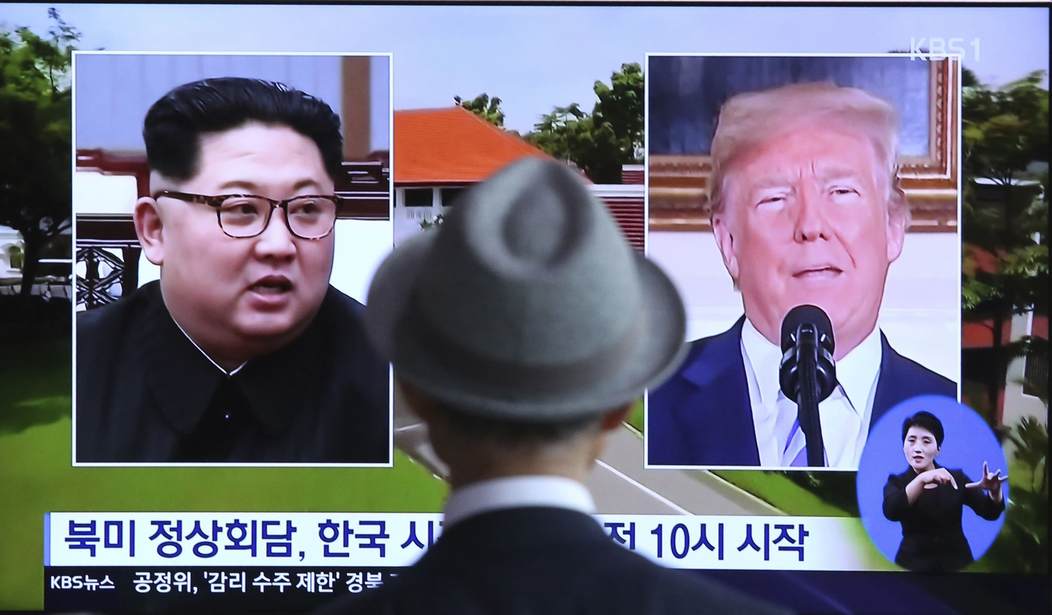The unprecedented, historic and weird summit (Dennis Rodman might be there) between President Trump and North Korea's Kim Jong Un, scheduled to begin Tuesday (today), if there are no surprises, could produce the denuclearization of the Korean Peninsula, or just more of the same lies and dissembling from North Korea we have seen before.
These days, world events do not occur in a vacuum.
Former Israeli diplomat Yoram Ettinger advises President Trump to see an interconnection between a potential deal with North Korea and the flawed nuclear deal with Iran made by the Obama administration.
On his blog "The Ettinger Report," he writes: "...the overall conduct of both rogue regimes -- as far as abandoning or advancing nuclearization, ending or expanding terrorism, subversion and ballistic capabilities -- has been immensely impacted by the U.S. negotiation posture. Thus, the less assertive and more eager is the U.S., and the more reluctant it is to use the military option, the less deterred and the more radicalized are Iran and North Korea."
He goes on to make a point that should be obvious from even a cursory study of history, which is that dictators look for weaknesses in their adversaries and exploit what they find. That President Trump demonstrated strength and resolve when he wrote Kim a letter, initially canceling the summit after some of Kim's associates threatened the United States, is likely what led to a quick re-scheduling of the event. Trump lawyer Rudy Giuliani demonstrated his gift for overstatement when he said Kim got "back on his hands and knees" begging for the get-together, but with some hubris modification he has a point.
Recommended
What has perceived weakness in both the Clinton and Obama administrations produced? Ettinger, who remembers more than these administrations would like us to forget, writes: "Since the July 2015 Joint Comprehensive Plan of Action (the Iran Nuclear Agreement), the Ayatollahs have radicalized and intensified their military involvement in Iraq, Syria, Lebanon and Yemen, as well as their subversive and terrorist operations, aiming to topple all pro-U.S. Arab regimes in the Persian Gulf, the Arabian Peninsula (primarily Saudi Arabia and Bahrain), Jordan and Egypt, as well as multitude of pro-Western regimes in Asia and Africa, and entrenching their anti-U.S. presence in Latin America."
Furthermore, he notes, "Since July 2015, The Shia' Ayatollahs have escalated their subversive efforts to annex the Saudi-supported island of Bahrain, which they consider an Iranian province, where a 70 percent Shia' majority is ruled by the Sunni House of Khalifa. In the process, Teheran has smuggled military systems to its terrorist network in Bahrain."
It is why Ronald Reagan's slogan (and more than a slogan) "peace through strength" worked and why peace through appeasement never does.
Iran behaves as if the nuclear agreement with the U.S. gave it a green light to step up their support of terrorism. They are already tops in that category.
Ettinger concludes his analysis with this: "Since July 2015, the Ayatollahs have bolstered their military assistance to the anti-Saudi Houthi (mostly Shia') rebels in Yemen. They consider Yemen -- Saudi Arabia's southern neighbor -- a platform to launch missiles into Saudi Arabia, in an attempt to destabilize and topple the House of Saud. Simultaneously, the Ayatollahs have expanded their incitement of -- and subversive initiatives in -- the oil-rich, Shia'-dominated regions of Al Hassa' and Qatif in the eastern part of Saudi Arabia."
One hopes President Trump has done at least a quick study of history -- past and more recent -- and is learning that only strength deters dictators from their ambitious goals. Any agreement with North Korea should be treated with the same skepticism one would have when dealing with Satan himself.
























Join the conversation as a VIP Member